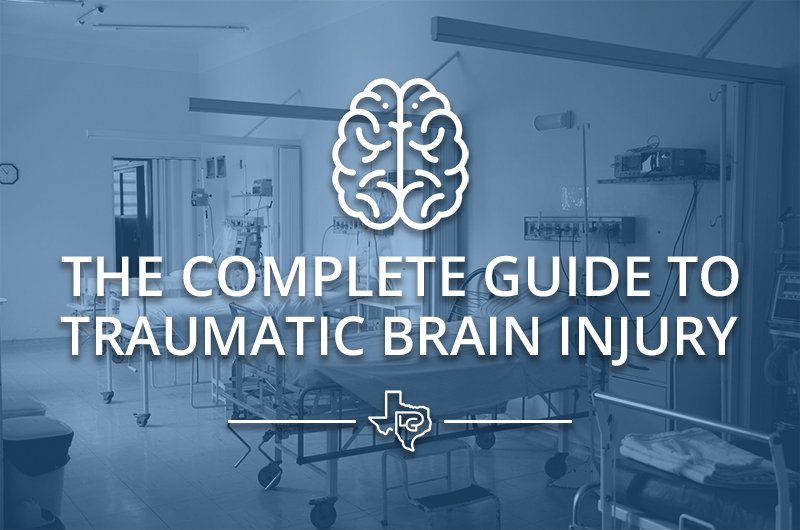
When you are in a vehicle accident, one of the most devastating injuries you can sustain is a traumatic brain injury (TBI). A TBI is one of the leading causes of disability or death in the U.S., and if you experience a TBI, the effect may last days, weeks or months, or it could even last for the rest of your life.
In a split second, you may suffer a brain injury that changes your life, possibly forever. You don’t actually have to experience a blow to the head to end up with a traumatic brain injury. When your body is jolted, your brain can slam against your skull resulting in damage to the brain.
What is a Traumatic Brain Injury?
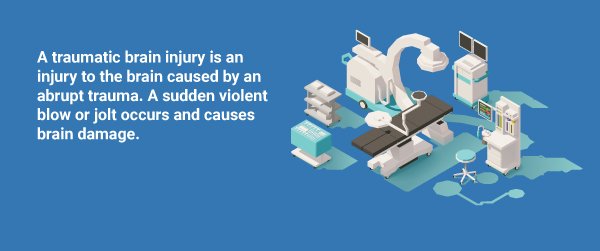
A traumatic brain injury is an injury to the brain caused by an abrupt trauma. A sudden violent blow or jolt occurs and causes brain damage. It can be mild, moderate or severe, and the severity of the injury determines the long-term prognosis for recovery. Minor injuries cause only short-term symptoms, but severe injuries are devastating and change the course of a person’s life forever.
A person’s brain is central to who they are and how they function on a day-to-day basis. While an injury to your back or limbs can be life-changing and painful, a brain injury can change every aspect of your life, including who you are as a person. It can impact everything from your personality to your mental abilities and your ability to effectively use the rest of your body.
TBI Statistics
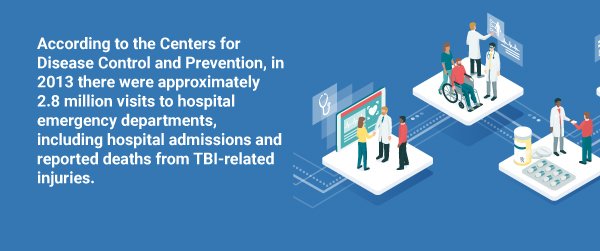
According to the Centers for Disease Control and Prevention, in 2013 there were approximately 2.8 million visits to hospital emergency departments, including hospital admissions and reported deaths from TBI-related injuries. Other statistics relating to traumatic brain injuries include:
- The deaths of nearly 50,000 people were related to TBIs
- There were over 280,000 hospitalizations for TBIs in 2013
- TBIs are a contributing factor in almost one-third of all injury-related deaths in the U.S.
- Motor vehicle crashes are the third leading cause of hospital visits, admissions or fatalities related to TBIs
- Motor vehicle crashes are the top leading cause of hospital visits, admissions or fatalities related to TBIs for those between the ages of 15 and 44.
- Injuries to the brain are the type of injury most likely to result in death or permanent disability
Types of Traumatic Brain Injuries
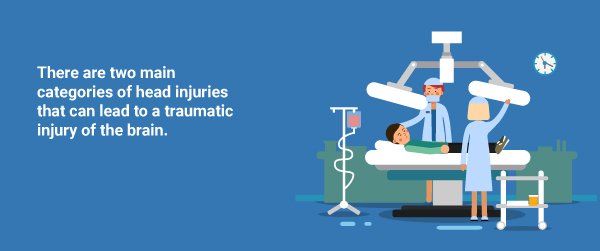
There are two main categories of head injuries that can lead to a traumatic injury of the brain. These include:
- Open head injuries – Also known as a penetrating head injury, an open head injury happens when an object penetrates the skull and enters the brain tissue. If the skull is fractured, this could be a piece of bone. In a car accident, it could be flying glass or debris. An open head injury is a medical emergency and needs to be treated immediately. It can result in bleeding or swelling of the brain, or a very serious infection could develop.
- Closed head injuries – There is no blood or visible penetration of the skull in these injuries, so the severity of the injury may not be apparent at first. If you have a closed head injury, you may have scratches and bruises from hitting your head on the dashboard or steering wheel. These injuries also happen from the head being jolted violently at the moment of impact.
Closed head injuries are divided into several other categories including:
- Coup-contrecoup brain injury – This is a type of injury that results from bruising of the brain which is caused when the force of a vehicle impact causes the skull to stop moving but the brain to continue moving and slam into one side of the skull, then bounce back to hit the other side.
- Concussion – This is considered a mild traumatic brain injury and is usually caused by a blow to the head. Signs may be subtle and not show up immediately, but once symptoms begin, they can last for days or weeks.
- Diffuse axonal injury – This is a serious form of brain injury caused when the brain rapidly shifts inside the skull because of a trauma causing the connecting fibers known as axons to be sheared. In most cases, this type of injury leads to loss of consciousness and causes permanent disability.
There can be other types of injury to the brain that are not immediately visible or apparent. Contusions are bruising of the brain, while a hemorrhage is uncontrolled bleeding in the brain or in the space between the brain and the skull. A hematoma is the clotting of blood outside the blood vessels.
Signs and Symptoms of a Traumatic Brain Injury
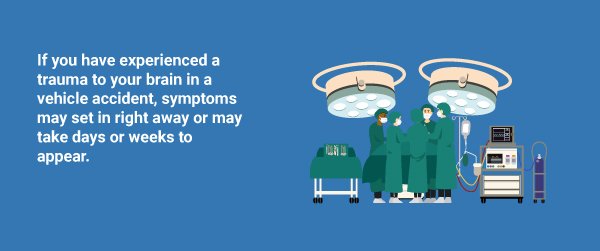
If you have experienced a trauma to your brain in a vehicle accident, symptoms may set in right away or may take days or weeks to appear. If you have had a mild traumatic brain injury, some of the symptoms you may experience include:
- Headaches
- Confusion or disorientation
- Brief loss of consciousness
- Drowsiness or dizziness
- Speech difficulties
- Nausea or vomiting
- Blurred vision
- Mood swings
- Memory or concentration problems
If your brain injury is moderate to severe, you may experience any of the above symptoms along with some of the following:
- Convulsions or seizures
- Loss of consciousness that lasts from several minutes to several hours
- Dilation of one or both pupils of the eye
- Loss of coordination
- Weakness in toes or fingers
- Continued nausea or vomiting
- Inability to wake from sleep
- Slurred speech
- Extreme confusion
- Coma
If you experience any of these symptoms either immediately after an auto accident, or days or weeks later, call a doctor right away to have your symptoms evaluated.
Long-term Complications of Traumatic Brain Injuries
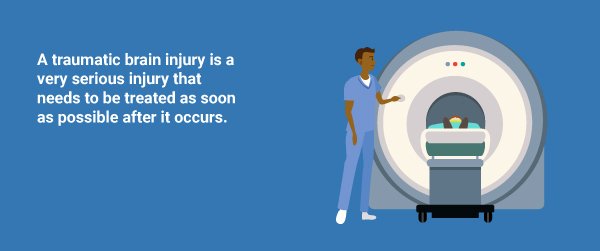
A traumatic brain injury is a very serious injury that needs to be treated as soon as possible after it occurs. Long-term complications that could happen include:
- Frequent headaches
- Vertigo or trouble with balance
- Seizures
- Hearing loss
- Vision loss
- Double vision
- Paralysis of facial muscles
- Loss of the sense of taste or smell
- Cognitive problems such as memory loss or problems concentrating, learning or problem-solving
- Difficulty with speaking or writing
- Mood swings and difficulty with emotional self-control
Treatment of Traumatic Brain Injuries
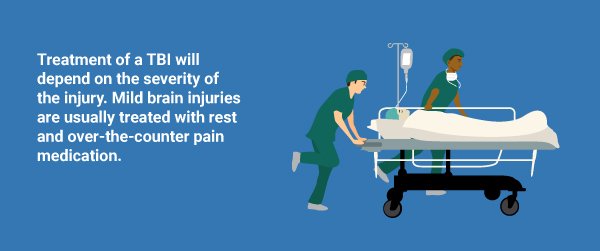
Treatment of a TBI will depend on the severity of the injury. Mild brain injuries are usually treated with rest and over-the-counter pain medication. It’s important to watch for signs that the brain injury could be worse than indicated at first.
Moderate to severe injuries may require many different types of treatment such as:
- Medication including anti-seizure medication
- Surgery
- Rehabilitation, including physical and occupational therapy and speech therapy if necessary
The Cost of a Traumatic Brain Injury
To determine a fair settlement amount, one of the most important things to look at is what the TBI has cost you or what you have lost because of your injury. Damages are usually divided into two categories:
Financial
A traumatic brain injury almost always causes major financial consequences. The cost of medical care is part of your financial losses. If your injury was severe, your medical costs may be ongoing for a very long time, possibly the rest of your life. Costs of projected future care should be considered before settling on a fixed settlement amount. Financial losses also include lost wages and lost earning capacity.
Non-economic
It can be more difficult to determine what else you have lost because of your injury, but there’s a good chance your losses go beyond money. This category includes things that are hard to put a financial price tag on, such as emotional distress, pain and suffering, loss of self-confidence or damaged relationships.
Impact of an Injury to Your Brain
Your brain is central to everything you do. A very severe TBI may leave you incapacitated and unable to work. It may affect your ability to communicate, remember or relate normally to other people. It can cause you to have to relearn activities you do on a daily basis such as walking, bathing or dressing yourself.
A less severe injury can still have a big impact on your life. You may suffer ongoing headaches or struggle with forgetfulness. You may have complications that you didn’t have before your accident, such as seizures, difficulty concentrating or an inability to control your emotions.
You may run across doctors who try to minimize your symptoms or imply that they are not related to the accident. Some signs of a brain injury can be subtle and may be overlooked by doctors, such as slowed thinking, emotional outbursts or loss of coordination.
If you or your family are convinced that your symptoms are the result of the accident, it’s important to be persistent and find a doctor who listens to what you are saying. A thorough evaluation of your brain function should be done, especially if you’re continuing to deal with symptoms that you didn’t have before the accident that have lasted weeks or months after it happened.
Compensation for Traumatic Brain Injuries
There are significant costs—financial, emotional, and physical—for a traumatic brain injury (TBI). According to the National Library of Medicine, “in-hospital costs per patient were generally high and ranged from $2,130 to $401,808”—which doesn’t include extensive rehabilitation, adjustments made to the home, home health care attendants, and other needed services.
If another person’s negligent behavior caused the accident, it could result in a viable case for compensation. The amount of money damages depends on the extent of the injuries. Further, the symptoms of a TBI can vary significantly from one person to another–including personality changes as well as chronic pain, dizziness, vomiting, and irritability, to name a few.
Compensation could include the following:
- Medical care. One of the major expenses related to traumatic brain injuries is the cost of medical care. This can include emergency care and the potential for future medical needs, including intensive rehabilitation, which can be very expensive.
- Lost wages. For many people, a traumatic brain injury makes it impossible to maintain their employment. The physical and psychological consequences of even a moderate TBI could lead to weeks, months, or longer not earning an income. Therefore, seeking damages based on lost wages and future lost income is possible.
- Pain and suffering. Traumatic brain injuries frequently result in chronic, long-lasting physical pain. For some, it can be so severe that it impacts every aspect of a patient’s life. A personal injury lawsuit could recoup compensation based on the extent of that pain.
- Emotional distress. A traumatic brain injury can lead to lasting emotional trauma, which can last long after physical injuries fade. The emotional distress from a brain injury could also serve as the basis for financial compensation.
Average Settlement Amounts for a Traumatic Brain Injury
The amount of compensation that is possible to obtain for a traumatic brain injury varies widely from several thousand dollars to well over a million. The settlement that can be obtained for a mild brain injury wouldn’t be as large as those obtained for a major injury that caused loss of the ability to earn a good living or function independently. Each situation is different and there are many factors involved in coming up with settlement amounts.
Multimillion-dollar settlements are possible for those who suffer massive injuries. This is true since the cost of medical care will most likely continue to be astronomical long after the accident.
Treatment of a severe TBI may require extensive and lengthy hospitalization as well as time spent in a rehabilitation facility. If you’ve been severely injured, medical equipment may be required to allow you to be able to get around. This may include a wheelchair or orthopedic equipment and you may also need physical therapy or other types of therapy.
You may also be entitled to compensation for the impact your injury has had on your family. This includes both the financial losses and the emotional toll that a major injury may take on family members, especially children.
Getting Legal Advice
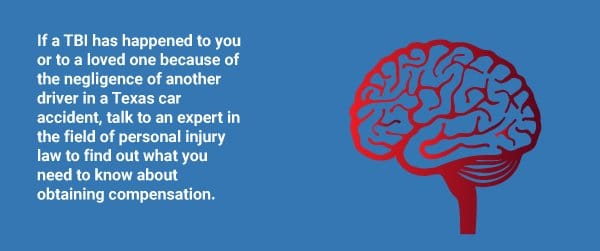
The long-term effects of a traumatic brain injury can be devastating. If a TBI has happened to you or to a loved one because of the negligence of another driver in a Texas car accident, talk to an expert in the field of personal injury law to find out what you need to know about obtaining compensation.
Contact Patterson Law Group by filling out the form on this page. One of our lawyers will get back to you to discuss what has happened and what can be done.





